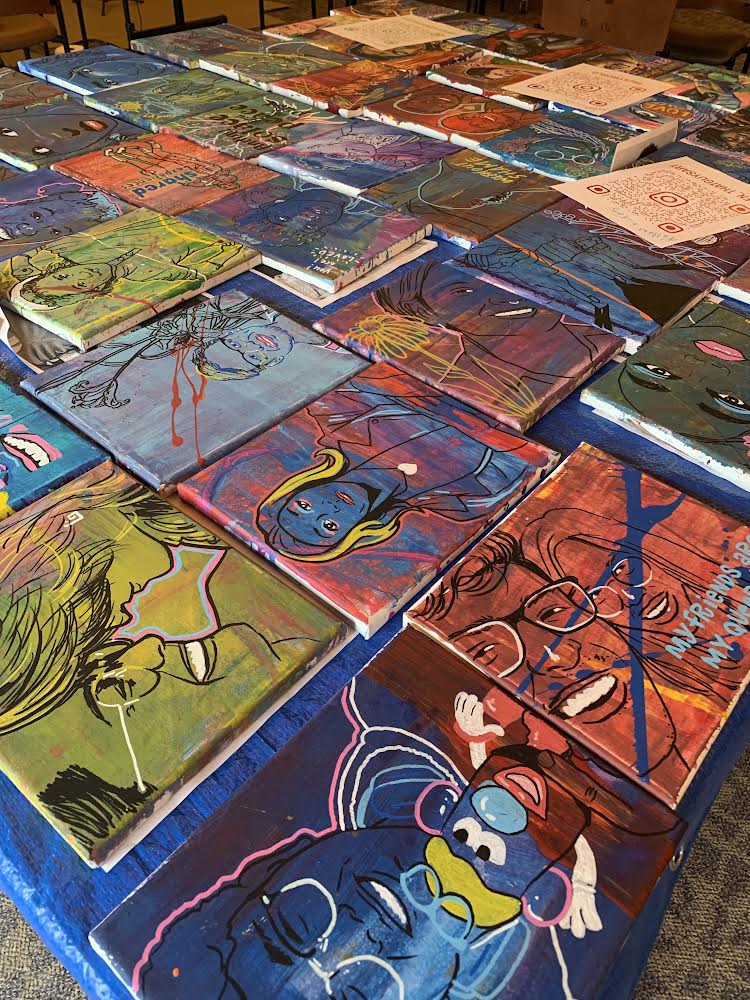The Colgate University LGBTQ Studies Program hosted artists and activists Paul Richmond and Briden Schueren for a week-long event titled ‘Queertopia’ from Feb. 26 through Feb. 29. Richmond and Schueren crafted portraits of Colgate’s LGBTQ community in the O’Connor Campus Center (the Coop), hosted a Brown Bag lunch on Tuesday, Feb. 27, and held a figure drawing workshop on Wednesday, Feb. 28.
Associate Professor and Director of LGBTQ Studies Danny Barreto organized Queertopia and explained in more detail what it entailed.
“Queertopia was a multifaceted and collaborative project aimed at celebrating and creating community through art and representing queer joy at a time when many states are passing laws that limit LGBTQ-identified folks’ access to health care, censure discussion of LGBTQ-related issues in schools and remove protections from discrimination and harassment,” Barreto said.
Barreto also explained how the artists created portraits of students through a collaborative process.
“Monday through Thursday, Paul [Richmond] and Briden [Schueren] worked day and night in the Coop, from [8 a.m.] in the morning to midnight, creating portraits of members of Colgate’s LGBTQ community. The paintings were based on photos submitted by students and incorporated text written by students about queer joy and what community means to them,” Barreto said. “[Richmond] and [Schueren] both worked on each of the portraits and invited students to also paint or draw on the canvases, making it a truly collaborative and collective process.”
Barreto initially invited Richmond and Schueren to a virtual class of his on Zoom during the COVID-19 pandemic, where they were able to host a figure drawing workshop for the professor’s first-year seminar course on masculinity. The class was such a success that he decided to invite them back the following semester.
“Drawing the body allowed students to question dominant representations of masculinity in art, discuss how different people experience their body and gender, and learn through artistic practice,” Barreto said. “Since the students who engaged in these workshops in 2020 as first-years are about to graduate, it seemed like a great time to bring [Richmond] and [Schueren] to campus for an in-person event and to expand the scope into the weeklong celebration, Queertopia.”
During their Women’s, Gender and Sexuality Studies Brown Bag talk, Richmond and Schueren discussed their personal and artistic journey. The artists initially tried out Queertopia in California, later talking about why they did it and why they wanted to bring it to Colgate.
“It was really about celebrating the entire community, bringing in everyone and kind of celebrating and spotlighting your joy, which is almost a rebellious act sometimes when you live in a world where there is so much adversity,” Richmond said. “But I think it’s important that we take time and space to be joyful and to celebrate the things that are awesome about all of us.”
Richmond and Schueren explained that a large part of their art is centered around redrawing masculinity. Schueren discussed how this was personal to him.
“Being somebody of the trans community, a lot of times we don’t get representative and enthralling experiences,” Schueren said. “I know every time I go to a nude beach, I try to find myself there to challenge myself to be naked in a space because our bodies also deserve to be in those spaces. So we thought, ‘Why not create our own redrawn masculinity?’”
Junior Emma Senglaub attended the Brown Bag event and shared her feelings on the discussion.
“That was unlike any other event that I’ve been to,” Senglaub said. “I think it was really informative and can be empowering for members of the LGBTQ community and also allies who are looking to […] further their allyship and think about how we can spread queer joy around campus.”
The Queertopia event wrapped up on Thursday, Feb. 29, with a pop-up art gallery in Pink Haus that displayed all 50 portraits. Attendees had the opportunity to acquire a portrait by donating to Trans Lifeline — a non-profit organization that provides trans peer support. A larger painting was also unveiled as a gift that will remain at Colgate. Guests were able to leave messages on a portrait of Nex Benedict to show their support for the non-binary Indigenous teenager who was recently assaulted and killed by classmates in Oklahoma. In addition, the concluding celebration also featured a performance by local drag queen Edie James.
Barreto explained why he thinks creating art is especially important in community building.
“Queertopia evidenced just how powerful a tool art can be,” Barreto said. “Not only did it build community through the collaborative project of creating these portraits and allowing people to come together to view and appreciate the finished pieces, but it also created opportunities for collective action, whether fundraising for a charity or sending support to the families and friends of Nex Benedict.”
Barreto was happy that the event also seemed to appeal to a wider audience than just the LGBTQ community.
“It gave students an opportunity to be seen the way they want to be seen,” Barreto said. “So many people who are not part of the LGBTQ community also commented on how much they appreciated the event, since it dealt with issues like body positivity, mental and emotional wellbeing, and representation — all of which are issues that extend well beyond the queer community.”
Both Barreto and the LGBTQ Studies Program at large were pleased with the execution of Queertopia.
“These events went above and beyond our hopes. So many people were involved in and touched by these activities that were at once artistic, academic, social and political,” Barreto said.














